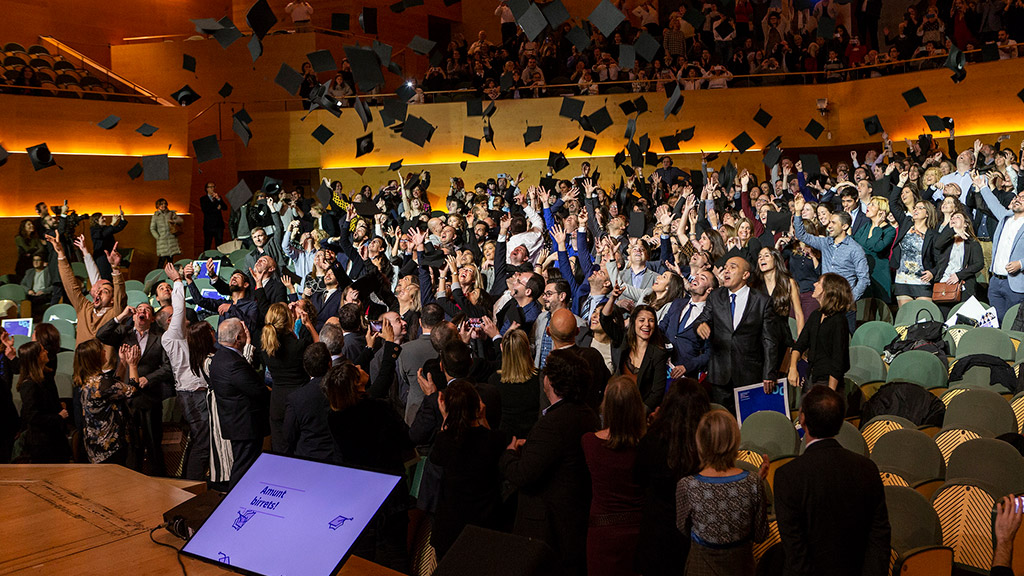There are twice as many graduates from university master's degrees than from bachelor's degrees
During the 2018/19 academic year, a total of 4,414 people have graduated from the UOC with a university master's degree and 2,069 with a bachelor's degree
According to the 2018 CYD Report on the prevailing trends in the Spanish university system, which was made public this September, the number of bachelor's degree graduates continues to drop (191,803 in the 2017/18 academic year) while the number of university master's degree graduates is increasing (112,122 in the same year). The same trend is detected at the UOC, where 4,414 people completed a university master's degree last year, while 2,069 graduated with an official bachelor's degree. The largest proportion of graduates comprises those who have studied and completed the University Master's Degree in Learning Difficulties and Language Disorders, followed by those who have graduated from the University Master's Degree in Education and ICTs (E-learning).
The data published by the Spanish Ministry of Education also corroborate this trend. About 205,000 people took a master's degree in Spain during the 2017/18 academic year, an 80.2% increase compared to the 2011/12 academic year. The proportion of students studying for master's degrees at private universities is higher than for bachelor's degrees, with a total of 73,744 enrolled students compared with 131,305 who chose a public university (2017/18 academic year). The branch of knowledge corresponding to Social and Legal Sciences accounts for 35,050 graduates from public universities compared to 37,893 from private universities. During the 2017/18 academic year, women made up more than half of the students enrolled on a master's degrees (54.8%) and 35.1% were under 25.
Àngels Fitó, the UOC's vice president for Competitiveness and Employability, believes that this trend is due to the fact that many people view a master's degree as the best option for boosting their career, which is also seen in the age range of master's degree students: according to data provided by the Ministry of Education, 32.41% of the enrolled students were aged between 26 and 30, and 11% were aged over 40 (2016/17).
Faced with major challenges, such as the transformation of the labour market and sustainable global development, "closing the gap between qualifications and professions has become a priority for universities, particularly when the different international observatories continue to highlight the mismatch between professional demand and university graduates' skill profile", Fitó explained.
"Training for employability puts the focus on designing programmes that cater specifically for new professional profiles but, above all, that pursue the cross-disciplinary development of professional competencies that facilitate lifelong professional training", the vice president for Competitiveness and Employability concluded.
The 2018 CYD Report analyses the integration of graduates from Spanish universities into the workplace and concludes that, among graduates' positive factors compared with the rest of the population, the higher the workers' level of training, the more possibilities they have of obtaining a full-time permanent contract or being self-employed and earning more money.
Carles Sigalés, the vice president for Teaching and Learning, attributed this trend to consolidation of the EHEA, under which university education includes both the bachelor's degree and the master's degree. "Nowadays, most students decide to go on to take a master's degree after completing the bachelor's degree", he explained. He also identified a second reason driven by the need for lifelong learning, which is also "growing", he said. Sigalés attributes the stagnation of bachelor's degrees to "demographic reasons and the fact that among the younger generations, a very high percentage of the population already has university training. However, the master's degree still has a lot of potential for growth".
The official master's degree that attracts the highest percentage of graduates to the UOC is the University Master's Degree in Learning Difficulties and Language Disorders. Its director, Llorenç Andreu, believes that this success is due to the "fact that teachers are strongly motivated to continue their training with the goal of improving education and offering more personalized education to students with the most difficulties in an inclusive school setting".
UOC students have the best career outlook in Spain
According to the study by the Catalan University Quality Assurance Agency (AQU) with regard to employment opportunities for graduates, the students who take online degree courses are more competitive in ICT, computer science and critical thinking. The report specifies that they have a higher level of theoretical training, written expression and the ability to solve problems, among other aspects. This group also stands out for their higher level of employment, greater stability and higher salaries (over 2,000 euros a month) than university graduates as a whole. This is borne out by the U-Ranking of the BBVA Foundation and the Valencian Institute of Economic Research (Ivie), which places the UOC as the university in Spain with the most career opportunities.
Since its creation 25 years ago, 77,956 people have graduated from the UOC with an official or UOC-certified qualification.
Experts UOC
Press contact
-
Editorial department
